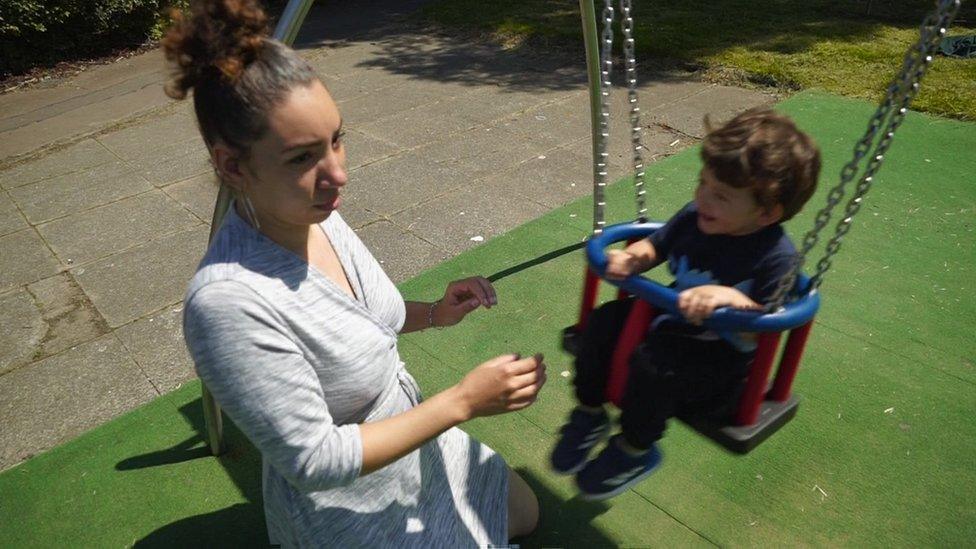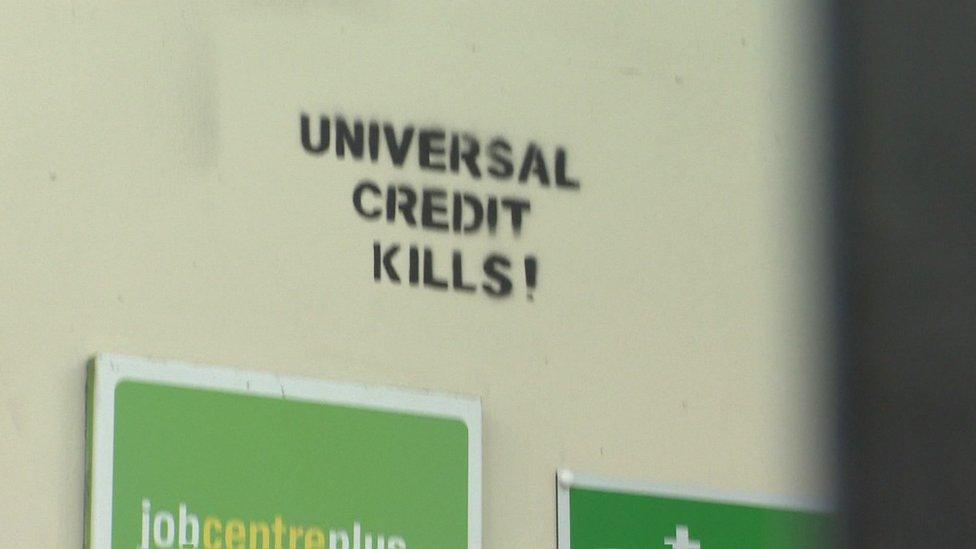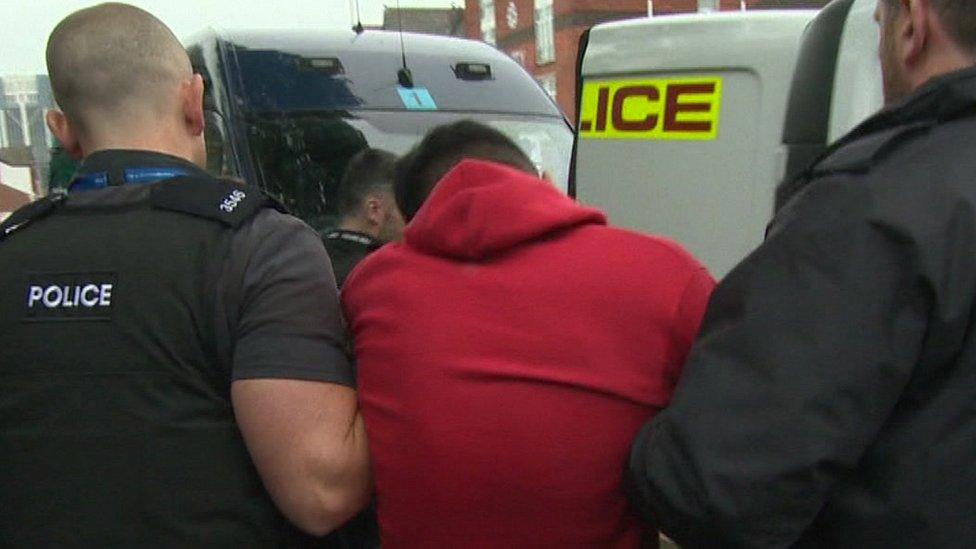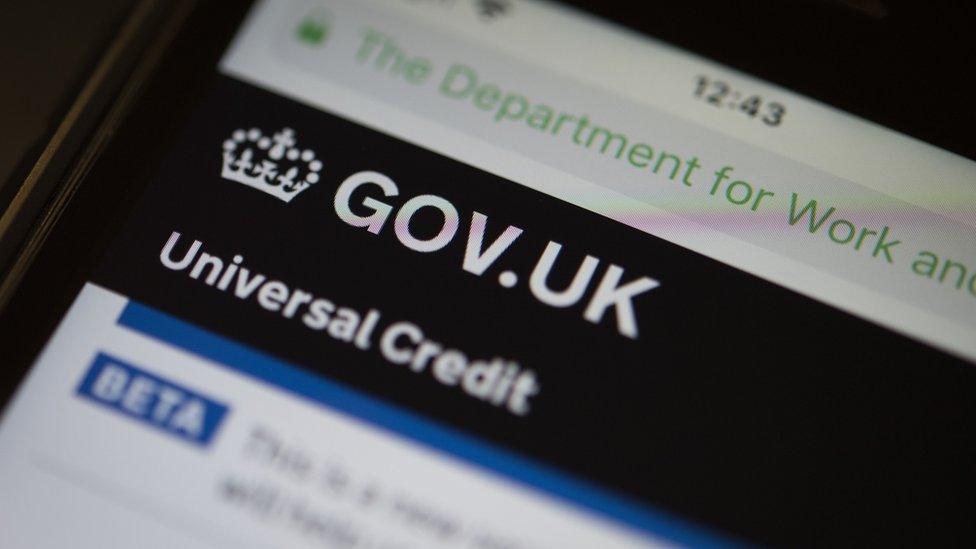Universal credit: Multi-million pound scam targets claimants
- Published
Jade Thomas was left hundreds of pounds out of pocket by a universal credit fraudster
Tens of millions of pounds of public money is believed to have been stolen, with claimants left owing hundreds, after fraudsters targeted Britain's main welfare benefit, universal credit.
The BBC has been told of "money pouring out of the public purse" as criminals make "staggering" bogus online claims.
A loophole in the online system is exploited to make fraudulent applications and claim advance loans.
The government says it is determined to bring fraudsters to justice.
A benefits official told the BBC that in one job centre more than a third of claims are currently suspected of being bogus, while £100,000 of fraudulent activity each month was recorded at another branch.
Claims include one from "a 19-year-old with six blind children" and another saying "Harry Kane" (the name of the Tottenham and England footballer) was their landlord.
Another official told the BBC that the Department for Work and Pensions estimates 10% of the 100,000 or more advances paid monthly are potentially bogus.
This suggests that fraud rates on universal credit are about four times higher than on most other benefits.
Ironically, one of the original goals of universal credit was to save about a billion pounds in fraud and error.
Jade's story
Jade Thomas, 31, from Manchester, now owes more than £1,500 of a loan arranged for her by a fraudster, but she had to pay him £1,000 for setting it up - so received only £525 of it.
"All he needed was my provisional licence and my bank card and a photo which he had to take there and then," she recalls.
"He had a badge from the Job Centre Plus... he was dressed smartly."
Within two or three hours the money, which she had been led to believe was a type of grant, was in her account.
She only realised it was a fraud, and that she would have to pay back the full amount, when her tax credits stopped and an official explained that she had been put on to universal credit.
The unexpected debt has pushed her into arrears with both her rent and council tax.

The scam pushed Jade Thomas into rent and council tax arrears
How does the scam work?
The fraudster contacts the claimant and says they can get them a government grant or a payday loan.
The claimant hands over their details and the fraudster makes a universal credit application on their behalf, sometimes unbeknown to the claimant.
The DWP approves the claim and transfers the money into the claimant's bank account, whereupon the fraudster demands a hefty "fee".
The scammer takes a large chunk of the cash, and disappears.
But because the money is a loan, the claimant is then left owing the entire amount to the DWP.

Claimants tricked
Messages from dozens of officials on an internal DWP message board, seen by the BBC, show the extent of the scam:
"How many more times can claimants add children named Ha, Ha and Ha to their UC claims, or add a landlord called Harry Kane, or add any other obviously made-up names to claim a UC advance?"
"This is a massive issue. They are literally making up street names and children (I have had Lisa, Bart and Homer recently, Simpsons cartoon characters) getting the money and we never hear from them again."
"A lot of what we see is uni students being approached to make a claim for a fee: 19 years old with six blind children."
The forum, which is open to operational staff within job centres, says the scam is particularly rife in the north-west of England.
"Around 200-300 new referrals every day" in the region are fictitious, wrote one official, and "at between £1,200 and £1,500 for each advance, the numbers are staggering".
Another official writes that "the loss of taxpayers' money could be in the region of £20m".

The scam is adding to concerns about the roll-out of universal credit
The first the victim knows that it is actually a scam is often when the DWP writes to say they are now on universal credit, and that any other benefits they are on are being stopped immediately.
The message board also shows the exasperation of staff that the senior leadership of the DWP are unable to stop the scam.
"To say there is a risk around UC advances is possibly the understatement of the year," wrote one staff member, who added: "Money is pouring out of the public purse like lottery jackpots every day.
"All of us 'on the shop floor' are screaming about it but nobody is listening who has any influence."
Another employee wrote: "That such a loophole exists and we are receiving massive individual and organised attacks to our benefit system puts this department to shame.
"As taxpayers, I would imagine we are all incensed that even though the system is broken and being targeted, we are still allowing the abuse to happen."
The Department for Work and Pensions said it had already secured its first conviction for this type of fraud.
DWP minister Baroness Buscombe added: "We're encouraging people to listen to their instincts. If someone offers you a low-cost loan from the government, they may be trying to steal your identity.
"Treat your personal information for benefits in the same way you would for your bank. And if you think you've been targeted, we urge you to report it urgently."

How does universal credit work?
Universal credit combines six "legacy benefits" into one monthly means-tested payment. The legacy benefits are working tax credits, child tax credit, jobseeker's allowance, income support, employment support allowance and housing benefit
A single universal credit payment is paid directly into the claimant's bank account each month
More than 1.5m people across Great Britain currently receive benefits through universal credit
- Published26 June 2019

- Published20 May 2019

- Published22 May 2019

- Published16 January 2019
